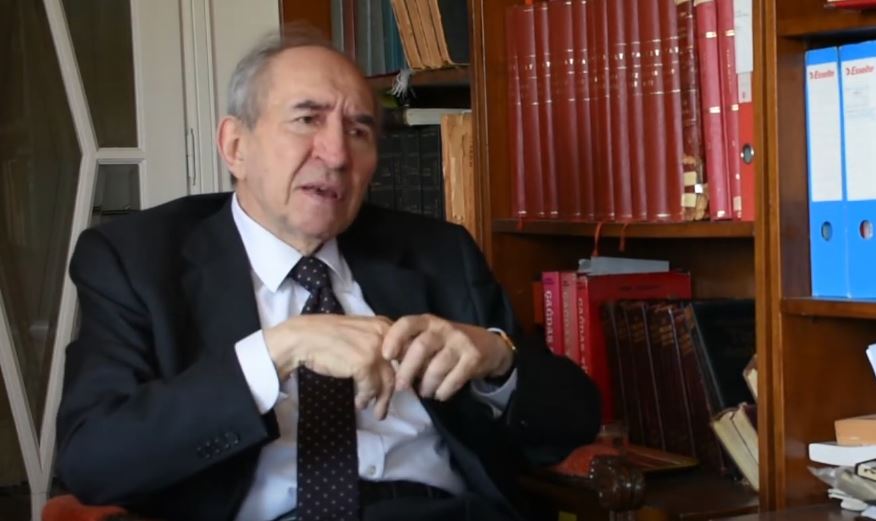
Growing up in a family that was committed to public service, Altan Öymen spent his early years at Ankara Atatürk High School establishing the theoretical foundation for his extraordinary career. He was notable even as a teenager for his quiet discipline and unusually keen curiosity, frequently carrying books that were too complex for the majority of his peers to understand. By the age of 18, Öymen was already employed as a parliamentary correspondent, while the majority of students were struggling with exams. Juggling his studies and journalism was more than just multitasking; it was a turning point in his life that demonstrated his early dedication to responsible citizenship.
He enrolled in the prestigious Faculty of Political Science at Ankara University, which produced many of Turkey’s most influential statesmen, after graduating from high school. This was not your average school setting. It served as a testing ground for change, especially during the turbulent 1950s. Öymen covered press stories that shaped the country’s political identity while attending lectures on diplomacy and public administration. This simultaneous immersion in theory and practice laid the groundwork for his future success as a journalist and policymaker.
Altan Öymen – Personal and Professional Profile
| Name | Altan Öymen |
|---|---|
| Date of Birth | June 20, 1932 |
| Place of Birth | Istanbul, Turkey |
| Date of Death | July 19, 2025 |
| Age at Death | 93 |
| Nationality | Turkish |
| Education | Ankara Atatürk High School; Faculty of Political Science, Ankara University |
| Career Start (Journalism) | 1950 (at age 18) |
| Major Media Roles | Ulus, Akşam, Cumhuriyet, Milliyet, Radikal |
| Founder | ANKA News Agency (1972) |
| Political Roles | Press Attaché (Bonn), MP (1977, 1995), Minister of Tourism, CHP Leader (1999–2000) |
| Major Publications | “Bir Dönem Bir Çocuk”, “Değişim Yılları”, “Öfkeli Yıllar”, “…ve İhtilal” |
| Legacy Project | Altan Öymen Library (Beşiktaş, Istanbul) |
When Turkey was being drawn by conflicting foreign influences during the Cold War, Öymen’s education served as a compass. He not only acquired technical knowledge of governmental systems, but he also acquired a fair-minded viewpoint on ideologies, which would prove to be a very useful ability when negotiating divisive public debate. It should come as no surprise that he was named press attaché at the Turkish Embassy in Bonn, Germany, by the 1960s. His international experience deepened his understanding of democratic customs and press freedom, which he would fervently support for the rest of his life.
He established the ANKA News Agency after returning to Turkey in the early 1970s. This was not only an entrepreneurial move, but it also decentralized journalistic control in a very effective way. At a time when Turkish media frequently supported prevailing political agendas, ANKA emerged as a voice for independent reporting. Aspiring journalists could use Öymen’s model as a highly adaptable guide: combine thorough research with unafraid reporting, and never sacrifice the truth. His editorials, which were frequently written with surgical precision, brought him recognition and admiration across the country over the years.
Leveraging his growing popularity and intellectual capital, Öymen was elected as a deputy from Ankara in 1977 under the Republican People’s Party (CHP) banner. Despite his brief tenure as Minister of Tourism, his concepts were remarkably progressive. He thought that promoting Turkey’s rich cultural legacy could serve as a means of national diplomacy in addition to being a source of income. This idea, which was unorthodox at the time, is now a fundamental component of contemporary cultural policy in emerging economies.
With Öymen’s 1995 return to parliament, the party made a fresh attempt to close the generational divide. Citing statistics, quoting global precedents, and always establishing arguments in historical context, his speeches frequently demonstrated the analytical mindset he developed while attending college. He was chosen to be the CHP chairman in 1999. Even though he was only in office for 15 months, his term was extremely fruitful. Compared to prior positions, his leadership style was noticeably better, emphasizing team communication over strict hierarchy.
Altan Öymen’s return to journalism following his resignation as party leader was what really made him stand out. He rejoined Radikal and resumed writing, whereas many politicians withdraw into consulting or silence. His columns were education in action, not merely commentary. Even non-experts could appreciate his unusually clear tone when discussing domestic policy, international affairs, and constitutional law. He had a rare gift of being able to explain complicated topics without making them easy to understand.
The Altan Öymen Library in Beşiktaş is one of the most enduring monuments to his intellectual contribution. Constructed around his personal collection of more than 12,500 books and thousands of periodicals, this facility is a thriving center for scholars and students. The goal was not only to preserve his memory but also to make sure that the same sources that influenced his thinking would be available to future generations. The initiative was very successful in reaching young minds because the library was located in a district with nine universities. Öymen’s commitment to ongoing civic discourse is further demonstrated by the venue’s frequent panel discussions and cultural events.
Öymen was clearly moved during the ceremony. He expressed gratitude to the municipality for making his lifelong collection available to the public. “These books are not just mine—they belong to the people who will write our future,” he said in his closing remarks, which were modest but powerful. His lifelong belief that education is a public legacy rather than merely a private possession was aptly encapsulated in that moment.
Altan Öymen’s legacy extended beyond his career by the time of his death in July 2025. He had created a road map for how politics, journalism, and education could all function together—not as separate but as complementary forces. In a time when false information travels more quickly than the truth and public confidence in institutions keeps declining, Öymen’s methodical journey seems both pertinent and necessary.
